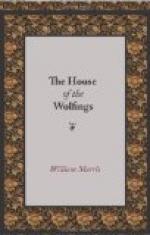She drew aback a little from him, and his eyes cleared of the slumber, and he saw her that she was scantily clad in black raiment, barefoot, with no gold ring on her arms or necklace on her neck, or crown about her head. But she looked so fair and lovely even in that end of the night-tide, that he remembered all her beauty of the day and the sunshine, and he laughed aloud for joy of the sight of her, and said:
“What aileth thee, O Wood-Sun, and is this a new custom of thy kindred and the folk of God-home that their brides array themselves like thralls new-taken, and as women who have lost their kindred and are outcast? Who then hath won the Burg of the Anses, and clomb the rampart of God-home?”
But she spoke from where she stood in a voice so sweet, that it thrilled to the very marrow of his bones.
“I have dwelt a while with sorrow since we met, we twain, in the wood: I have mourned, while thou hast been merry, who deemest the war-play good. For I know the heart of the wilful and how thou wouldst cast away The rampart of thy life-days, and the wall of my happy day. Yea I am the thrall of Sorrow; she hath stripped my raiment off And laid sore stripes upon me with many a bitter scoff. Still bidding me remember that I come of the God-folk’s kin, And yet for all my godhead no love of thee may win.”
Then she looked longingly at him a while and at last could no longer refrain her, but drew nigh him and took his hands in hers, and kissed his mouth, and said as she caressed him:
“O where are thy wounds, beloved? how turned the spear from thy breast, When the storm of war blew strongest, and the best men met the best? Lo, this is the tale of to-day: but what shall to-morrow tell? That Thiodolf the Mighty in the fight’s beginning fell; That there came a stroke ill-stricken, there came an aimless thrust, And the life of the people’s helper lay quenched in the summer dust.”
He answered nothing, but smiled as though the sound of her voice and the touch of her hand were pleasant to him, for so much love there was in her, that her very grief was scarcely grievous. But she said again:
“Thou sayest it: I am outcast; for a God that lacketh mirth Hath no more place in God-home and never a place on earth. A man grieves, and he gladdens, or he dies and his grief is gone; But what of the grief of the Gods, and the sorrow never undone? Yea verily I am the outcast. When first in thine arms I lay On the blossoms of the woodland my godhead passed away; Thenceforth unto thee was I looking for the light and the glory of life And the Gods’ doors shut behind me till the day of the uttermost strife. And now thou hast taken my soul, thou wilt cast it into the night, And cover thine head with the darkness, and turn thine eyes from the light. Thou wouldst go to the empty country where never a seed is sown And never a deed is fashioned, and




